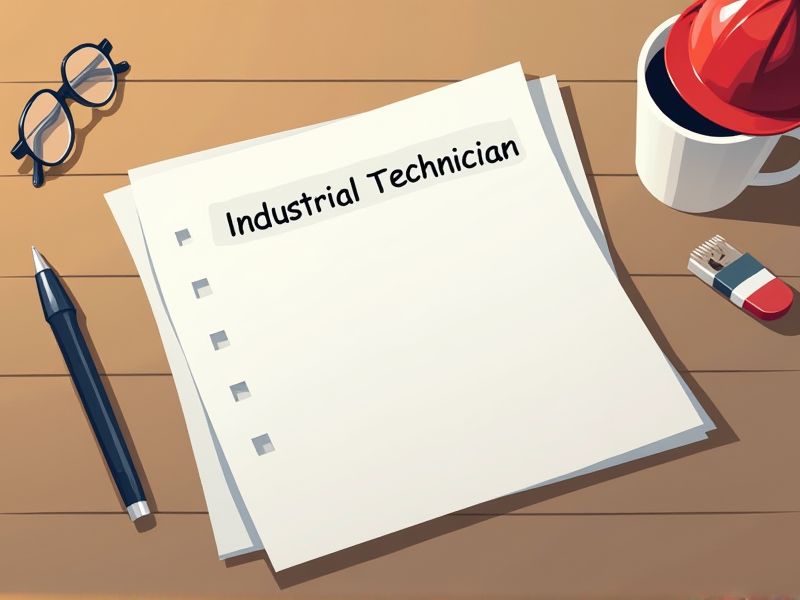
Industrial Technicians operate in complex environments that require precision and adherence to stringent industry standards. Certification ensures these professionals possess the essential knowledge and skills, minimizing error risks and enhancing operational safety. Employers often seek certified technicians to guarantee compliance with regulations and foster confidence in maintenance and troubleshooting capabilities. Here are some important certifications you may need as an Industrial Technician.
OSHA 10-Hour General Industry Certification
Industrial Technicians often work in environments where exposure to hazards is common, and OSHA 10-Hour General Industry Certification equips them with knowledge on safety regulations. Compliance with OSHA standards can significantly reduce workplace accidents and injuries, leading to safer working conditions. The certification enhances an employee's understanding of their rights and responsibilities, promoting a culture of safety. Many employers require this certification as part of their risk management strategy, ensuring that all staff are trained to handle potential hazards.
OSHA 30-Hour General Industry Certification
Obtaining the OSHA 30-Hour General Industry Certification enhances an industrial technician's understanding of essential safety regulations and standards. Increased awareness leads to a reduction in workplace injuries and accidents, fostering a safer working environment. Employers recognize the certification as a demonstration of a technician's commitment to maintaining compliance with federal safety standards. The certification's detailed coverage of industry-specific hazards ensures that technicians are better equipped to identify and address potential risks.
Certified Maintenance & Reliability Technician (CMRT)
Certified Maintenance & Reliability Technician (CMRT) credential validates an industrial technician's expertise in maintaining and improving machinery reliability, which can lead to fewer operational disruptions. The certification helps in standardizing best practices across teams, leading to more efficient maintenance procedures and safer work environments. Acquiring CMRT certification often enhances career prospects and positions technicians as valuable assets in high-demand fields. Companies witnessing increased machine uptime benefit economically, justifying the importance of having CMRT-certified technicians on staff.
Certified Production Technician (CPT)
Industries require a Certified Production Technician (CPT) to ensure that workers possess standardized skills essential for efficient production processes. Quality improvement and increased productivity result from the CPT program's focus on safety, maintenance, production, and quality assurance. Employers depend on certified technicians to reduce operational errors and equipment failures. The certification supports workforce development by aligning workers' skills with advanced manufacturing technologies.
Lean Six Sigma Green Belt Certification
Industrial technicians benefit from Lean Six Sigma Green Belt Certification as it equips them with tools to optimize processes, reducing waste and improving efficiency. This certification fosters enhanced problem-solving skills, enabling technicians to identify and rectify issues effectively within production lines. Companies often seek certified professionals to drive quality improvements and cost reductions, impacting bottom-line positively. The certification also enhances career prospects, as it marks individuals with a commitment to continuous improvement and operational excellence.
Industrial Automation Certification (Rockwell/Siemens)
Industrial automation certifications, such as those from Rockwell or Siemens, validate a technician's proficiency in managing sophisticated automated systems, directly impacting their employability and job performance. With these certifications, technicians are equipped to handle increasingly complex machinery, reducing downtime and improving productivity across industrial operations. Training through these programs ensures that technicians are up-to-date with current technologies and best practices, fostering a safer and more efficient working environment. Companies prefer certified professionals, as they often lead to cost savings through more accurate system diagnostics and quicker problem resolution.
Electrical Safety Certification (NFPA 70E)
Electrical Safety Certification, such as NFPA 70E, reduces the risk of incidents by ensuring technicians are trained in identifying electrical hazards. Compliance with this certification minimizes workplace injuries, which directly decreases costs associated with medical expenses and downtime. NFPA 70E promotes a culture of safety, leading to enhanced productivity and morale among technicians. By adhering to these standards, companies avoid legal liabilities and potential fines related to negligence in electrical safety practices.
Lockout/Tagout (LOTO) Certification
Lockout/Tagout (LOTO) certification is essential to prevent accidental equipment start-up during maintenance, which significantly reduces workplace injuries. OSHA requires LOTO compliance for safety, and certification ensures that industrial technicians understand these vital protocols. LOTO procedures protect technicians from hazardous energy sources, minimizing risks like electrocution or mechanical hazards. Proper certification contributes to a safer work environment, which can lead to improved operational efficiency and lower insurance costs.
Forklift Operator Certification
Forklift operator certification ensures industrial technicians understand safety protocols, reducing workplace accidents. Certified technicians demonstrate proficiency, which increases operational efficiency and productivity. Legal regulations often mandate certification to minimize liability for businesses. Employers prefer certified operators, ensuring compliance and reducing insurance costs.
Hazardous Materials (HAZMAT) Certification
A HAZMAT Certification is needed for industrial technicians to ensure they can safely handle and dispose of dangerous materials, reducing the risk of accidents in the workplace. This training provides technicians with knowledge and skills essential to comply with legal regulations, which helps organizations avoid substantial fines and legal repercussions. Certified technicians are more adept at preventing environmental contamination by following appropriate safety protocols, minimizing the potential for environmental damage. By understanding proper emergency response procedures, certified technicians contribute to both workplace safety and public health.
Summary
When you obtain certifications as an Industrial Technician, your job market value increases significantly. Employers tend to prioritize candidates with certifications, leading to better job prospects and potentially higher salaries. Holding certifications also enhances your technical credibility and competence. This professional development enables you to tackle complex industrial tasks more effectively.
